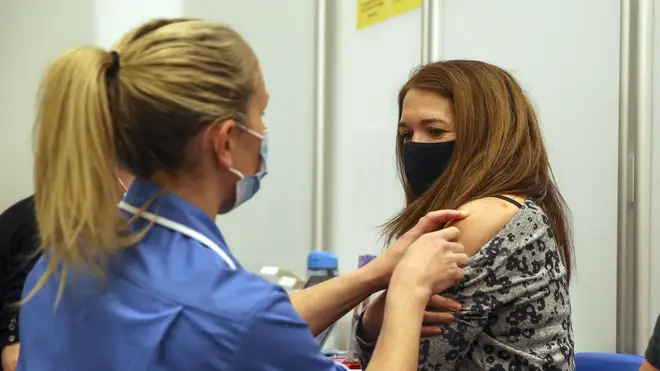
Paul Brand 10am - 12pm
13 May 2021, 00:03 | Updated: 13 May 2021, 08:02

New data shows Covid's prevalence in England is at its lowest level since August and indicates vaccines are stopping deaths.
The latest figures from Imperial's React-1 (Real-Time Assessment of Community Transmission) study show a clear reduction in prevalence from March to April and early May.
Researchers say there is a divergence between infections and hospital admissions and deaths which shows how vaccines are working.
Steven Riley, professor of infectious disease dynamics at Imperial College London, said: "What you can see in recent times - basically since the widespread rollout of the vaccine - and we showed this last time, that you see a decoupling of the relationship between the React infection and a lagged number of deaths.
Read more: UK's vaccine success 'could be reversed if jabs are not shared across the globe'
Read more: British public supports sharing of Covid-19 vaccines - poll
"And this gap is showing how we can have more infections in the population with far fewer deaths.
"And we actually see that difference growing nicely now for hospitalisations as well, so for each infection in the community we are producing fewer hospitalisations and far fewer deaths."
The study also shows a fall of infections in all age groups except those between 25 and 34.

Vaccines Minister's emotional tribute to the vaccination programme
A "significant fall" in infections in 55 to 64-year-olds was seen by researchers.
"This coincides with the rollout of the vaccine programme to the younger part of that age group," Professor Paul Elliott, director of the React programme, said.
Health Secretary Matt Hancock added: "Today's findings demonstrate the impact our incredible vaccination rollout is having on COVID-19 infection rates across the country, with prevalence lowest amongst those more vulnerable people aged 65 and over."
Across the UK, 35,722,461 first doses have been given out while 18,438,532 second doses have been jabbed.
The UK is aiming to offer all adults a first dose before the end of July. People aged 38 and 39 are to be eligible for a jab tomorrow.
Read more: EU refuses to renew Oxford Covid vaccine order as it backs Pfizer jab
Read more: Third Covid vaccine jab 'to be offered to over 50s in autumn'
React-1 looked at 127,408 swab tests which were taken across England between April 15 and May 3. Swab positivity dropped in that time by half - from 0.20% to 0.10%.
It also examined variants of coronavirus, with two of three cases in London identified as the Indian variant. Neither of those participants had been abroad in the two weeks prior, Imperial said.
Prof Elliott, when asked if the data supported another tranche of easing restrictions, said: "It is a difficult question because we have low levels of prevalence in the community, and we've got low levels of disease in hospitals and deaths, so that's good.
"But I think that the patterns in the Indian variant are cause for some concern."
He said the variant needed further study to understand its characteristics and spread.